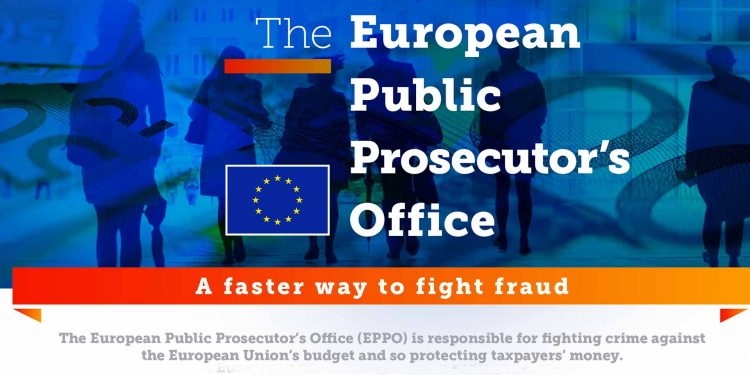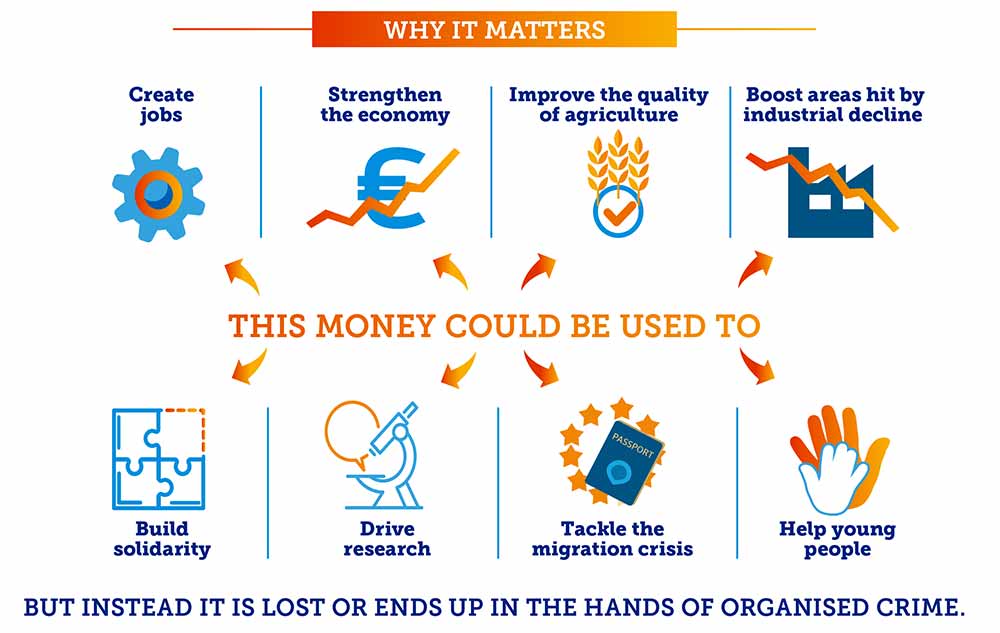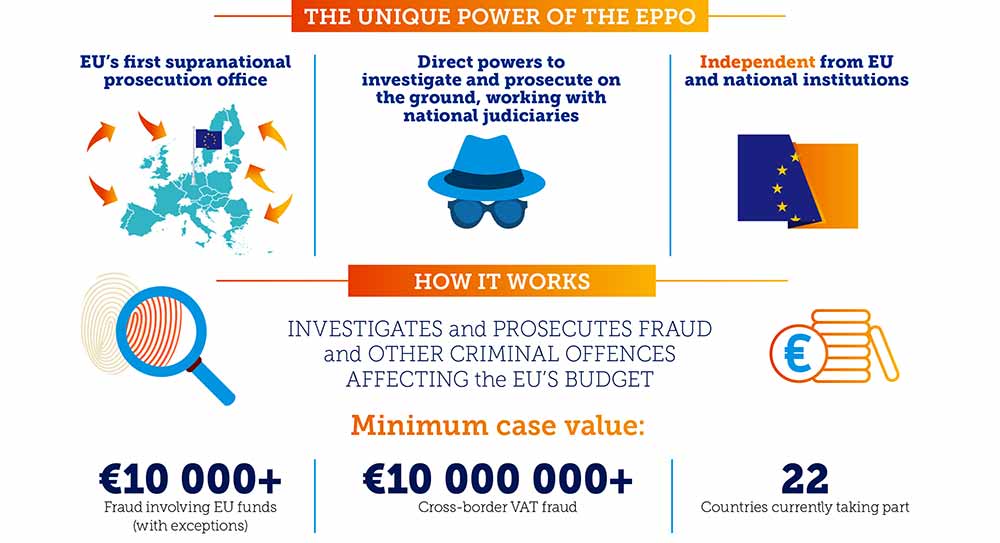The EPPO is an independent European Union body competent to fight crimes against the Union budget and launched its operations on 01 June 2021. The European Public Prosecutor’s Office is an independent and decentralised prosecution office of the European Union, with the competence to investigate, prosecute and bring to judgment crimes against the EU budget, such as fraud, corruption or serious cross-border VAT fraud.
The Regulation establishing the European Public Prosecutor’s Office under enhanced cooperation was adopted on 12 October 2017 and entered into force on 20 November 2017. At this stage, there are 22 participating EU countries. Denmark, Ireland, Hungary, Poland and Sweden do not participate in the EPPO. Before the EPPO became operational, only national authorities could investigate and prosecute fraud against the EU budget. But their powers stopped at national borders. Existing EU-bodies such as Eurojust, Europol and the EU’s anti-fraud office (OLAF) lack the necessary powers to carry out criminal investigations and prosecutions.
European Public Prosecutor’s Office (the EPPO)
On 1 June 2021, the European Public Prosecutor’s Office launched its operations and started to investigate and prosecute crimes affecting the Union’s financial interests. As of this date, EU institutions and bodies, as well as the competent authorities of the 22 Member States participating in the European Public Prosecutor’s Office, shall without undue delay report to the European Public Prosecutor’s Office any criminal conduct in respect of which it could exercise its competence. Any individual can also report alleged cases of fraud and other crimes affecting the Union budget directly to the European Public Prosecutor’s Office.
Vice-President Vera Jourová, Commissioner Johannes Hahn and Commissioner Didier Reynders made the following statement, welcoming the start of activities of the European Public Prosecutor’s Office:
“As of today, the European Public Prosecutor’s Office (EPPO) is up and running. This opens a new chapter in fighting cross-border crime. The first supranational prosecution service is launching its operations to protect the EU taxpayer’s money, competent to investigate and prosecute crimes like money laundering, corruption and cross-border VAT fraud.
New OLAF rules help EU prosecutors to Anti-Fraud
In 2019 alone, Member States reported fraud affecting EUR 460 million of the EU budget. Such fraudulent activities have a direct impact on people’s everyday lives, inflicting serious economic damage. This has to stop, all the more so because COVID-19 has deeply challenged our economies and we need every euro for the recovery.
Now, the European Public Prosecutor’s Office steps in to strengthen the protection of the budget of the EU. It will observe the implementation of NextGenerationEU with an eagle eye to make sure funds will reach our economy and our citizens. EUR 750 billion in loans and grants are at stake.
EU launches EPPO to target misuse of EU cash
This newly created EU body is fully independent. It will prosecute and bring the suspected perpetrators of crimes to justice in the 22 participating EU Member States. Sweden has expressed its interest and is planning to join the EPPO in 2022. We encourage the four Member States that chose to stay out to join as well. Because crime knows no borders – we need to fight it together.”
European Public Prosecutor’s Office has its seat in Luxembourg
The European Public Prosecutor’s Office operates as a single office across all participating EU countries and combines European and national law enforcement efforts in a unified, seamless and efficient approach. The European Public Prosecutor’s Office is organised on two levels: the central and the national level. The central level consists of the European Chief Prosecutor, 22 European Prosecutors (one per participating EU country), two of whom are appointed as Deputy European Chief Prosecutors, and the Administrative Director.
The European Chief Prosecutor and all the European Prosecutors form the College of the European Public Prosecutor’s Office. The decentralised level consists of European Delegated Prosecutors who will be located in the participating EU countries. The central level supervises the investigations and prosecutions carried out at the national level. As a rule, the European Delegated Prosecutors handle the case in the Member State where the alleged offence was commited and carry out the investigations and prosecutions in their Member State.
It will complement the work carried out by the European Anti-Fraud Office OLAF
The rights of the suspects and accused persons are guaranteed by comprehensive procedural safeguards based on existing EU and national law. The European Public Prosecutor’s Office shall ensure that its activities respect the rights guaranteed by the Charter of Fundamental Rights of the EU, including the right to fair trial and the rights of defence. The procedural acts of the European Public Prosecutor’s Office are as a rule subject to judicial review by the national courts. The Court of Justice of the European Union has jurisdiction in a limited number of cases but can ensure a consistent application of EU law by means of preliminary rulings.

















